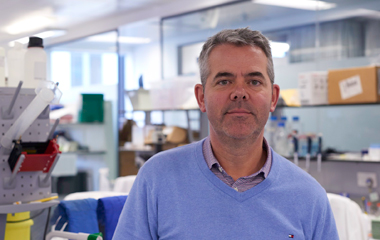Repurposing drugs to treat glioblastoma
Fast facts
- Official title: PARADIGM-2: Olaparib and radiotherapy or olaparib and radiotherapy plus temozolomide in newly diagnosed glioblastoma stratified by MGMT Status: 2 parallel phase 1 studies.
- Lead researcher: Professor Anthony Chalmers
- Where: Institute of Cancer Sciences Wolfson Wohl Cancer Research Centre Glasgow
- When: August 2016 – July 2023
- Cost: £74,973 (co-funded with Cancer Research UK)
- Research type: Phase 1 clinical trial, Glioblastoma, Adult
What is it?
Previous research has demonstrated that olaparib, a drug currently used to treat ovarian cancer, has also been effective in controlling glioblastoma brain tumour growth. Olaparib works by blocking the DNA damage repair mechanism in our bodies, preventing the tumour’s ability to heal itself after it’s been damaged by treatment.
With our funding, the research team, led by Professor Chalmers, will carry out a phase 1 clinical trial to test olaparib in combination with the current standard of treatment, which currently consists of surgery, followed by radiotherapy and chemotherapy. The aim of a phase 1 clinical trial is to figure out the dose of the drug and any side-effects to ensure the drug is well-tolerated.
This phase 1 clinical trial comprises of two parallel groups of patients, all of whom are newly diagnosed with a glioblastoma. Group 1 will be given olaparib in addition to chemotherapy and radiotherapy, while group 2 will be given olaparib in addition to only radiotherapy.
Why is it important?
Glioblastoma, an aggressive high grade brain tumour, affects over 2,500 people in the UK each year. Despite these people undergoing treatments (which includes surgical removal of the tumour, radiotherapy and chemotherapy) many find their brain tumour returns, therefore recurrence is common for this tumour type.
Glioblastoma recurrence can be largely attributed to the fact that this brain tumour type is made up of a variety of different cells. This means that a particular treatment might only affect a certain type of cell, leaving the others unharmed and allowing the tumour to continue growing. It’s therefore imperative that we analyse other drugs that could be combined with the current standard of treatment to help improve outcomes and quality of life for people diagnosed with glioblastoma.
Who will it help?
This collaborative clinical trial will provide evidence as to whether or not the addition of olaparib to the current standard of treatment improves outcomes for those with a glioblastoma. This trial aims to help people affected by glioblastoma and their loved ones.
Milestones
Achieved
- The trial is now open and the team have recruited 16 participants so far.
Upcoming
- The research team are going to continue to recruit more participants to the trial.
- They’ll also continue to monitor the side-effects of olaparib when given in combination with the current standard of treatment.
If you have any questions about this, or any of our other research projects, please contact us on research@thebraintumourcharity.org
Research is just one other way your regular gift can make a difference
Research is the only way we will discover kinder, more effective treatments and, ultimately, stamp out brain tumours – for good! However, brain tumours are complex and research in to them takes a great deal of time and money.
Across the UK, over 100,000 families are facing the overwhelming diagnosis of a brain tumour and it is only through the generosity of people like you can we continue to help them.
But, by setting up a regular gift – as little as £2 per month – you can ensure that families no longer face this destructive disease.
In this section

Professor Chalmers is Chair of Clinical Oncology at the University of Glasgow. His main research interest is in improving outcomes for patients with glioblastoma by combining radiotherapy with targeted drug therapy.